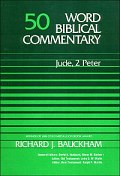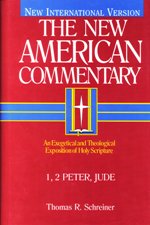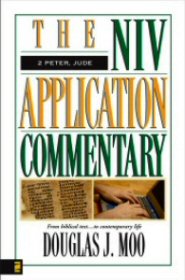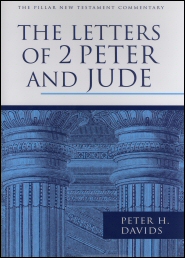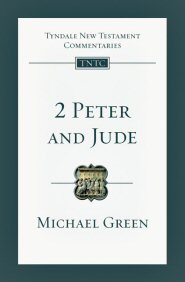Best Resources on Jude
"Jude writes to a community that needs to take a stand for the truth. A group of false teachers has entered the Church. Through false revelations, they are prompting believers to use the grace of God as license for immorality, especially of the sexual kind. Jude warns against compromising with evil. He points out that the false teachers, in their selfish actions, have rejected the authentic Jesus. Jude challenges Christians to remain firm in the faith that leads to eternal life. He encourages Christians to live as people empowered by the Holy Spirit, standing in the love of God (Jude 17–21)."
—Faithlife Study Bible, Lexham Press
Everything You Need to Study & Teach Jude
Expository Preaching Kits are curated resources all focused on helping you teach a single book of the Bible—keeping you prepared without weighing you down.
Best commentaries on Jude
Richard Bauckham, Word Biblical Commentary (WBC), Thomas Nelson, 1983, 377 pp.
One of the earliest works of groundbreaking scholar Richard Bauckham, this commentary provides a detailed examination of the socio-historical context with a special emphasis on the political state of the ancient world at the end of the first century. Bauckham reviews textual data and draws out insight and applications for contemporary life.
- Level: Advanced
- Type: Technical
Thomas R. Schreiner, New American Commentary (NAC), B&H, 2003, 497 pp.
Highly respected biblical scholar and theologian Thomas Schreiner guides readers through the practical yet profound epistles of 1 & 2 Peter and Jude. Focusing on their message that love manifests itself in godly living and that right doctrine must be matched by Christlike lives, he presents a thorough section-by-section exposition of the intrinsic theological and exegetical concerns.
- Level: Intermediate
- Type: Intermediate
Douglas J. Moo, NIV Application Commentary (NIVAC), Zondervan, 1996, 320 pp.
Today the fiery, unapologetic language of 2 Peter and Jude can open our eyes to stark spiritual realities. Like few other apostolic writings, these two letters shake us awake to the vital necessity of embracing the true gospel and transmitting it undistorted. The message is as countercultural as possible and profoundly timely.
- Level: Intermediate
- Type: Devotional
Peter H. Davids, Pillar New Testament Commentary (PNTC), Eerdmans, 2006, 348 pp.
Filling a notable gap in scholarship on 2 Peter and Jude, Peter Davids artfully unpacks these two neglected but fascinating epistles that deal with the confrontation between the Greco-Roman world and the burgeoning first-century Jesus communities. Davids firmly grasps the overall structure of these oft-maligned epistles and presents a strong case for 2 Peter and Jude as coherent, consistent documents. Marked by exceptional exegesis and sharp, independent judgments, Davids’ work both connects with the latest scholarship and transforms scholarly insights into helpful conclusions benefiting Christian believers.
- Level: Intermediate
- Type: Expository
Michael P. Green, Tyndale New Testament Commentaries (TNTC), InterVarsity Press, 1987, 208 pp.
The second letter of Peter and the letter of Jude both address false teaching—teaching that affects behaviour. The recipients had within their midst people whose lives contradicted the gospel that was preached. They defiled the love-feasts; they were themselves immoral and minimized the importance of law in the Christian life. They scoffed at the parousia and were fond of their own rhetoric. Michael Green offers a penetrating analysis that sets both letters in their historical context and shows their relevance to life today.
- Level: Basic
- Type: Devotional
Best Books on Jude
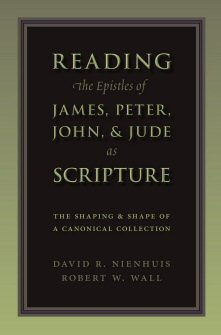
Reading the Epistles of James, Peter, John & Jude as Scripture: The Shaping and Shape of a Canonical Collection
Through a detailed examination of the historical shaping and final canonical shape of seven oft-neglected New Testament letters James, 1 & 2 Peter, 1, 2, & 3 John, and Jude, this text introduces readers to the historical, literary, and theological integrity of this indispensable apostolic witness. While most modern scholars interpret biblical texts against the diversity of their individual historical points of composition, Robert Wall and David Nienhuis make the case that a theological approach to the Bible as Scripture is better served by attending to issues that occasioned these texts’ historical point of canonization—those key moments in the ancient Church’s life when apostolic writings were grouped together into collections designed to maximize the Spirit’s communication of the apostolic rule of faith to believers everywhere.
Learn more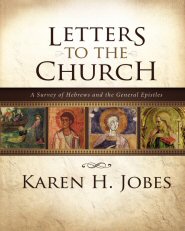
Letters to the Church: A Survey of Hebrews and the General Epistles
Respected New Testament scholar Karen Jobes explores the cultural and theological background of Hebrews and the General Epistles (James through Jude) in this rich commentary. Writing from an evangelical perspective, Jobes addresses issues of historical relevance as well as how these ancient books connect with Christian faith and practice today.
Learn more
Churches under Siege of Persecution and Assimilation: The General Epistles and Revelation
In this third and final book of a three-volume series, B. J. Oropeza covers the writings of the General Epistles and the communities in the book of Revelation—the seven churches in Asia Minor. In Hebrews there were warnings of apostasy with no restoration, yet in James there can be restoration of apostates. Peter identifies marginalized Christians and apostate teachers. Jude confronts apostate intruders. Revelation is about overcoming assimilation in the Asia Minor communities.
Learn more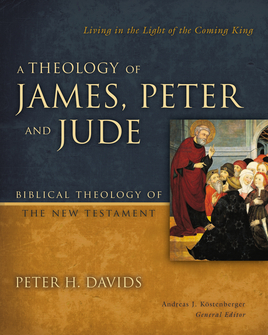
A Theology of James, Peter, and Jude: Living in The Light of the Coming King
Peter Davids offers a comprehensive study of the General or Catholic Epistles of James, 1 & 2 Peter, and Jude, which are often insufficiently covered in more general New Testament introductions, theologies, and surveys. Before discussing a theology of each of the four letters, Davids first deals with their common aspects—their shared background in the Greco-Roman world and a similar Christology, view of the source of sin, and eschatology—thus justifying their being treated together. In the chapters that follow, Davids embarks upon a theological reading of each letter informed by its social-rhetorical understanding—what they meant in the context of their original cultural settings—including: a survey of recent scholarship, a discussion of relevant introductory issues, a thematic commentary, a treatment of important theological themes, and a discussion of the place of the letter in the biblical canon and its contribution to New Testament theology.
Learn more
New Testament Foundations: A Guide for Christian Students, Volume 2: The Acts, The Letters, The Apocalypse
The second volume of New Testament Foundations: A Guide for Students examines New Testament studies on Acts, Paul’s letters, the General Epistles, and Revelation. Ralph Martin’s work is characteristically intelligent and easy to understand. His principled analysis considers a variety of perspectives in a measured voice, avoiding dogmatic presumptions.
Learn moreBest Courses on Jude
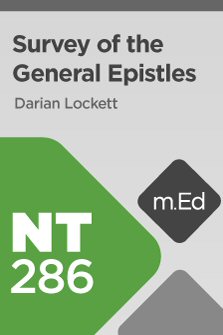
Mobile Ed: NT286 Survey of the General Epistles (11 hour course)
This course covers the seven biblical letters known as the Catholic Epistles. After an overview of the Catholic Epistles in general, students will explore issues such as authorship and audience in James, as well as themes such as perfection/wholeness, faith, works, and justification. First and Second Peter are covered next with a focus on submission, suffering, and responding to false teachers. The course concludes with a look at Jude and the letters of John.
Learn more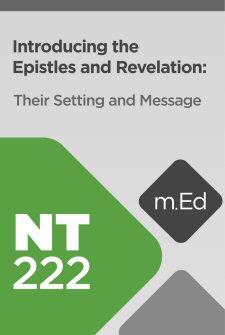
Mobile Ed: NT222 Introducing the Epistles and Revelation: Their Setting and Message (12 hour course)
This course explores the books of Romans through Revelation with particular attention to their historical setting and culture. In addition to providing an overview of each book, topics such as authorship, audience, theology, major themes, presenting problems, and pastoral strategies are discussed in depth.
Learn more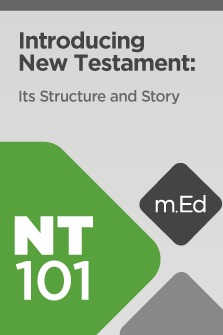
Mobile Ed: NT101 Introducing New Testament: Its Structure and Story (6 hour course)
Gain a better understanding of the New Testament's structure and themes with New Testament scholar Dr. Lynn Cohick. You'll examine elements such as historical context, writing techniques of the Gospels' authors, developments in the early Church, the settings of the Epistles, the genre of the book of Revelation, and the life of Jesus.
Learn more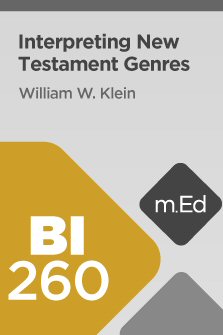
Mobile Ed: BI260 Interpreting New Testament Genres (9 hour course)
Develop a new level of competency in interpreting the New Testament with Dr. William Klein’s guidance and insight on New Testament genres. Learn how to interpret the different genres found in the New Testament Epistles. Distinguish which events in Acts are meant to be descriptive—describing what happened—and which are meant to be prescriptive—instructing on how to live. Discover how the book of Revelation combines three genres and how this affects its interpretation.
Learn more